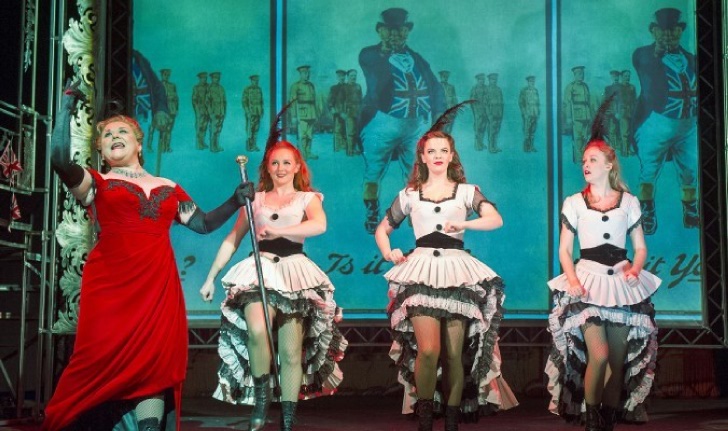
 |
|
|
|
|
The end of the trench show  Oh What a Lovely WarBirmingham Rep***** It’s extremely funny, sparky and pithy. But it’s also, as Terry Johnson’s vital and mischievous WWI centenary revival staging, currently touring to the Birmingham Rep, produced by Judy Lloyd and Matthew Mitchell, shows, piercingly satirical, perceptive and poignant, be it the punchy dialogue or the wealth of tunes of the time, drawn from a wide variety of musical and libretto sources, worked into a magnificent medley. After a
lightheartedly shambling opening (with cavorting Pierrots, and gags:
‘My grandfather had his tongue shot off. Never talks about it.’ Or
‘Who would be without a sense of humour? Germany!’), and
terrifically energised overture, the show soon begins to show its
mettle. Throughout, the grim events of the Great War are evoked in vivid, enlarged black and white photographs and on a kind of continuous chronology that flits across overhead. But rapidly the human element emerges: two Boche soldiers giving the first agonised inkling of the appalling casualties experienced on all sides; and a splendidly inept drill parade presided over by the indefatigable Ian Reddington, a master of the stage who acts as a kind of master of ceremonies, to blissfully amusing effect – and is one of those rare actors who can actually conduct perfectly. Reddington has the gift of almost effortlessly capturing an audience. He was an undoubted hit with this one. It’s not just the
chaps who run away with the show. The three girls in this gutsy
production – Emma Crossley, Lauren Hood and Bleu Woodward – are
quite brilliant: endlessly inventive, impudent, daring, as their
opening dance with a swirl of multi-layered skirts showed; plus add
the superstar among them: Wendi Peters as a busty grande madame,
produces one of the most sizzling voices of the evening: somehow she
manages (‘On
World War I brought slaughter on an industrial scale But this was a superb team performance, with a host of vignettes that teased and entertained. Following endless parleying between four nations’ leaders (Alex Giannini spiritedly pompous as both the German Kaiser and a domineering French general), came a vivid car ride, the three passengers brilliantly choreographed, moving in unison to suggest the shell-splintered terrain. The 1914 Christmas Day in the Trenches sequence was beautifully paced, moving by stages from ‘It was Christmas Day in the Cook House’ to the meeting of the two enemy sides, an ingeniously staged football match, and splendid dying ‘Good-byeee’. The signal tune, ‘Oh What a Lovely War’, the terrific hit song recapitulated at the end, was delivered with fiery zest en masse by the entire company. But there were countless others, too. ‘Roses are flowering in Picardie’ was one classic; ‘If the sergeant steals your rum….’ another; ‘If you want the old battalion we know where they are…’, yet another humdinger of a song, and bitterly, cruelly ironic. Add in ‘Pack up Your Troubles’, ‘Forward Joe Soap’s Army’, ‘The Bells of Hell Go Tingalingaling’, juxtaposed with an ironic gravedigging scene, and ‘I don’t want to Be a Soldier’ (‘I don’t want a bayonet up me arsehole, I don’t want my bollocks shot away; I’d rather stay in merry, merry England and fornicate my bleeding life away’; repeated, the song becomes one of the show’s favourite Leitmotifs). The finely honed quality of the soldiers’ singing in this cast must have rivalled the original bellowing in the trenches. Christopher
Villiers, after some effete campery early on, turns into one of the
star performers of this vigorous entertainment. His range of f The living and the dead To each Villiers
brought some witty and always apt gestures, superlative speaking and
memorable, attractive, beautifully pitched singing, all of which
picked him out as one of the show’s outstanding successes. Music Director Peter White, working his socks off, achieved many marvels with his varied, energised keyboard contributions, supported by a quartet of trumpet (Graham Justin adding style to Wendi Peters’ ‘On Sunday I Walked Out’, a vivid percussionist (Ryan Martin) and low strings (cellist Sarah Bowler performing Germany’s national anthem gently in the background was a an early high point) yet also occasionally produced some melting moments by letting the soloists or chorus perform a cappella, ie unaccompanied. The impact on each occasion was as intensely moving as getting the audience to join in the impossible tongue-twister ‘Sister Susie sewing shirts for soldiers’. We laughed tears and we wept tears. Joan Littlewood would have been mighty proud of this ensemble. To 09-05-15 Roderic Dunnett05-05-15
|
|
|
|